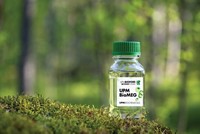Advertisement
Grab your lab coat. Let's get started
Welcome!
Welcome!
Create an account below to get 6 C&EN articles per month, receive newsletters and more - all free.
It seems this is your first time logging in online. Please enter the following information to continue.
As an ACS member you automatically get access to this site. All we need is few more details to create your reading experience.
Not you? Sign in with a different account.
Not you? Sign in with a different account.
ERROR 1
ERROR 1
ERROR 2
ERROR 2
ERROR 2
ERROR 2
ERROR 2
Password and Confirm password must match.
If you have an ACS member number, please enter it here so we can link this account to your membership. (optional)
ERROR 2
ACS values your privacy. By submitting your information, you are gaining access to C&EN and subscribing to our weekly newsletter. We use the information you provide to make your reading experience better, and we will never sell your data to third party members.
Specialty Chemicals
Ingevity to close Louisiana pine chemicals plant
Biofuel subsidies and market shifts made the site’s commodity products uncompetitive
by Craig Bettenhausen
November 16, 2023
| A version of this story appeared in
Volume 101, Issue 38

Faced with growing competition for its main raw material, the chemical maker Ingevity is closing its pine chemical plant in DeRidder, Louisiana, in the first half of 2024.
The site uses crude tall oil (CTO), a byproduct of pulp and paper production, to make adhesives and other commodities. The closure and related cuts will save Ingevity around $70 million per year but cost the company $280 million in the short term. About 300 employees will lose their jobs.
CTO is rich in fatty acids that Ingevity and other companies have been separating and upgrading for over a century. But biobased feedstocks like CTO are in increasing demand as a raw material for transportation fuels as companies move away from petroleum to lower their greenhouse gas emissions.
“CTO was in surplus. Now it’s short,” says Dan Dunleavy, managing director of Ingevity’s Renewable Ventures unit. At the same time, demand is shrinking fast for rosin, a major fraction of CTO that isn’t easily made into fuels. The DeRidder plant makes rosin into ingredients for the inks and papers used to print magazines, for example, a market that has been declining.
Jeffery Yost, a consultant specializing in pine and oleochemicals, says CTO has historically traded at about $450 per metric ton. Earlier this year it got up to $2,250 per metric ton, and is currently around $1,100, Yost says. “It’s not going to get better. If anything, it’s going to get worse.” For legacy markets built on cheap CTO, “this is a wrecking ball,” he says.
Government incentives are a major driver of changes in the CTO market, according to Matthew Stone, managing director of the market research firm Prima. At the Alternative Fuels and Chemicals Coalition’s recent conference in Washington, DC, Stone told attendees that US tax credits from the Inflation Reduction Act of 2022 are “turbocharging the supply side for future fuels.”
Likewise, mandates from the European Union’s Renewable Energy Directive are creating demand for biobased diesel and other biofuels in the EU. As a result, Dunleavy says, US pulp and paper mills are exporting more than five times as much CTO to Europe as they used to.
Dunleavy says Ingevity gets its CTO under long-term contracts with pulp and paper mills in the US Southeast. He says that despite the draw from biofuels, Ingevity plans to redirect the feedstock used in DeRidder to its other pine chemicals plants, which make higher-margin chemicals such as battery materials and aerospace lubricants.



Join the conversation
Contact the reporter
Submit a Letter to the Editor for publication
Engage with us on Twitter